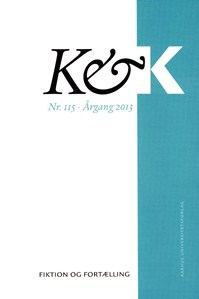FUSIONEN AF FIKTION OG IKKE-FIKTION - UDFORDRING AF DORRIT COHNS FIKTIONSTEORI
DOI:
https://doi.org/10.7146/kok.v41i115.15876Nøgleord:
Dorrit Cohn, fiction and nonfiction, Peer Hultberg, The Distinction of Fiction, free indirect discourseResumé
THE FUSION OF FICTION AND NON-FICTION | Dorrit Cohn’s influential theory of fiction draws a clear distinction between the fictive and non-fictive narrative domains. Though to some extent useful in the examination of fictive and non-fictive features in literary narratives, Cohn’s theory exhibits certain limitations and contradictions when submitted to careful investigation. These weaknesses in Cohn’s theory become conspicuous when viewed in the light of one of the most progressive tendencies in contemporary European literature, which is exactly a merging of the traditionally divided domains: fiction and nonfiction. Requiem by Danish Peer Hultberg, Min kamp by Norwegian Karl Ove Knausgård and Atemschaukel by German Herta Müller constitute interesting examples of this tendency. The application of Cohn’s theory to these specific works entails a strong challenge of anumber of pivotal ideas in her conception of fiction since none of the works can be placed in either of Cohn’s domains without a considerable reduction of their expression. The works thus represent a fusion. The combination of fiction’s privilege of use of distinctive fictional discourses, most notably free indirect discourse, with nonfiction’s privilege of referentiality results in the production of an extra dimension. Through fusion the works illustrate the potentiality of narrative in creating an expression that
exceeds what fiction and nonfiction are capable of individually, and, consequently, they point toward the necessity of analytical operation beyond a clear division between fictional and non-fictional narrative.
Downloads
Citation/Eksport
Høeg, M. P. (2013). FUSIONEN AF FIKTION OG IKKE-FIKTION - UDFORDRING AF DORRIT COHNS FIKTIONSTEORI. K&K - Kultur Og Klasse, 41(115), 69–87. https://doi.org/10.7146/kok.v41i115.15876
Nummer
Sektion
Artikler
Licens
Tidsskriftet følger dansk ophavsret.





